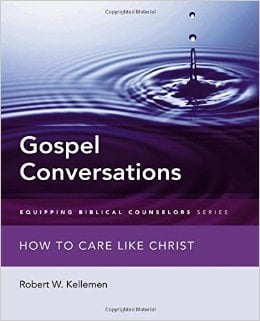⏱️ Estimated Reading Time: 6 min read
I often tell my students that the best Biblical Counselors are those who have received good Biblical counseling. Dr. Robert Kellemen believes the same thing. “We learn to become competent biblical counselors by giving and receiving biblical counseling in the context of real and raw Christian community” (17). In Gospel Conversations, he applies this premise to the discipline of equipping counselors in the local church. This book is the perfect lab manual for training counselors, because it combines theory, practice, and community.
Kellemen is a practitioner. He has been involved in training counselors for over two decades. Though he has served as the Executive Director of the Biblical Counseling Coalition and as a professor at a Bible College, he does not write as a theorist. He has been a counselor and a trainer for long enough that he can give incredible insight into both the process of counseling and equipping. Counselors and pastors will do well to listen to him and to read his numerous books. Gospel Conversations stands out, however, as a unique contribution to his work. The book, which is the second volume in his Equipping Biblical Counselors series from Zondervan, is designed to be “an experiential training manual that promotes real and raw, vulnerable and open relationships among your equipping group members” (17). The book is not designed to be simply read or lectured, it is designed to be engaged, and Kellemen has set the book up to help us do just that.
The book is broken down into five sections, following Kellemen’s philosophy of counseling. The first section establishes foundational issues. Though many of these can be discovered in his first volume Gospel-Centered Counseling, he gives us both some reminders and fresh insights in these opening four chapters. The book then traces four sets of counseling competencies, each addressing a specific type of Biblical Counseling: Sustaining, Healing, Reconciling, and Guiding.
One of the strengths of this volume is its comprehensiveness. Biblical counseling has often been characterized as simply addressing sin. Sometimes this characterization has warrant. Kellemen works against such notions in this volume showing that comprehensive and compassionate care involves addressing a variety of issues within the life of an individual. Sin is part of that equation, but so is sorrow, guidance, doubt, and encouragement. He walks us through how to avoid both sin-focus and sin-avoidance.
Within each section of the book, and in each chapter, there are guides to using the book for equipping. At the beginning of each section there is an outline of what to focus on in your small group labs. There we find what pages need to be read, which questions need to be answered, and what passages of Scripture to meditate upon. Within the chapters, then, readers will find the “built-in application/interaction” sections: Maturing as a Biblical Counselor. Here they will have a series of questions to answer in preparation for their lab discussions. The questions focus on “self-counsel,” “counseling others,” or counseling one-another.” These become useful focus points for group lab. In addition Kellemen encourages a series of other “on-the-job” training involving case studies, practicing “meta skills,” and a series of various observations (21-23). The book is incredibly interactive in this regard.
It’s unique design allows readers to see the theory in the method, to actually apply the method in lab, and to apply it as part of a group of counselors helping each other grow. The book combines all the best parts of equipping. It is not merely a textbook to read, but a manual to use. Kellemen has intentionally designed the book to be used in groups, and that means allowing readers both to be part of a community as the study and learn, but also allows them opportunities to apply the principles of the chapters and get feedback. Through its case studies, Maturing as a Counselor sections, and its various questions, readers will truly learn how to do Biblical Counseling. Since education is not merely information, but also practice, trainers need this volume. It combines the best tools to help us learn, apply, and grow as counselors.
My only criticism of Gospel Conversations probably reflects my personality. Dr. Kellemen aims to communicate clearly and compelling in this work. He utilizes, then, a number of devices to help illustrate the point of the chapter, crystallize the methods involved, and help readers retain what they read. These are great tools in the hands of a practitioner, but Kellemen, cam sometimes be overwhelming in his use of them. So, each of his four competencies comes with an acrostic. Sustaining competencies use GRACE, and healing competencies use RESTS. Sometimes the phrases associated with these letters seem, however, like he is stretching. So, the R in GRACE stands for “rich soul empathizing,” where “rich” seems like a strange adjective to use. The T in RESTS stands for “Theo-Dramatic Spiritual conversations.” This whole phrase seems less clarifying than it is intended to be. He even adds an E to PEACE for his Reconciling Relational Competency acrostic. Add to that he includes other acrostics underneath these categories. So, under the GRACE competency readers will find the acrostic LISTEN, which is intended to simplify the “basic components of competent gospel listening” (159). These various devices can, at times, be counterproductive. They become overwhelming and less clarifying than just direct communication. Again, this is a mild criticism, and one that probably reflects more of my own learning style than any actual weaknesses in Kellemen’s writing. He is, after all, the seasoned trainer. Perhaps he has seen immense success with these various devices. I was less impressed by them and found them more distracting, but with all the other strengths of this book I think they can be tolerated.
I highly recommend Gospel Conversations to all those involved in equipping counselors. This is a unique and engaging book written specifically for training. We will be utilizing it this Summer in our first Counseling Lab course, and I look to continue reaping its benefits for years to come.




